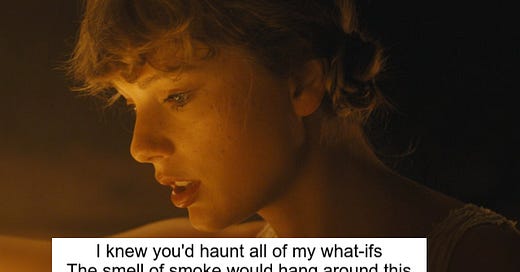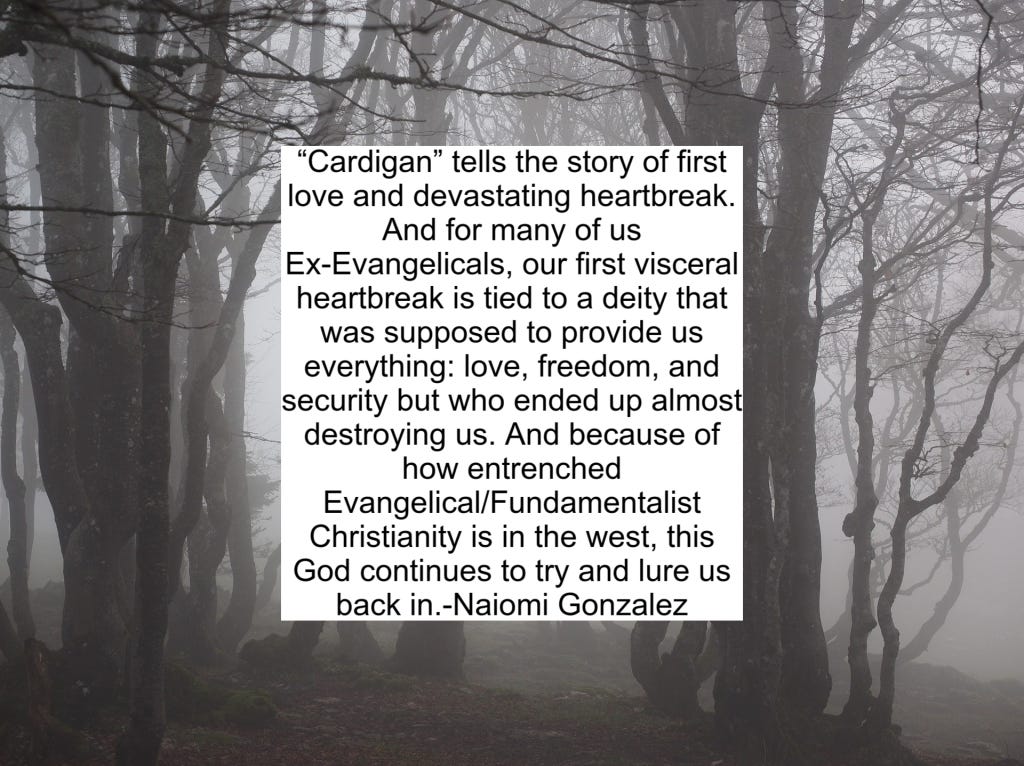Cardigan: Betrayed by God
Second in my Taylor Swift and Theology series
Taylor Swift's Folklore: Cardigan
I cry out to God; yes, I shout.
Oh, that God would listen to me!
When I was in deep trouble,
I searched for the Lord.
All night long I prayed, with hands lifted toward heaven,
but my soul was not comforted.
I think of God, and I moan,
overwhelmed with longing for his help.-Psalm 77: 1-3 NLT
I knew you'd haunt all of my what-ifs
The smell of smoke would hang around this long
'Cause I knew everything when I was young
I knew I'd curse you for the longest time.
Chasin' shadows in the grocery line
I knew you'd miss me once the thrill expired
And you'd be standin' in my front porch light
And I knew you'd come back to me-Taylor Swift, “Cardigan”
The second song, from Taylor Swift’s Folklore, is the beginning of a “mini-trilogy” comprised of “Cardigan”, “August,” and “Betty.” This mini-trilogy focuses on a teenage love triangle where the boy, “James” cheats on Betty with another girl. The three songs are from the viewpoints of each person involved in this love triangle. “Cardigan” is written from Betty’s perspective. It is a song that chronicles the magic of first love and the devastating heartbreak of its demise.
Now what does romantic love have to do with theology and God? Well, for better or for worse, comparing God’s love to romantic love, has been a fairly common analogy. Typically, God is viewed as the ever faithful, loving partner, while humanity is often depicted as the cheating, no good, partner that God loves and stays faithful to anyway. So, it wouldn’t be much of a stretch to theologically interpret the mini-trilogy in Folklore, in a similar way. God is Betty, and we humanity, are James, the cheater, and we can assign various temptations to be the one that we “cheat” on God with.
However, I am not really interested in that theological analogy. It seems too simple and pat. To be honest, I find the whole “romantic relationship is a metaphor of God’s love” to be super weird. I’m not going to completely get away from that analogy in this blog post, because I think the analogy in general can sometimes be useful, but I just wanted to get that out there, in case others, have found the comparison of God’s love with romantic love a bit unsettling. I think that for me, this has to do with the fact that Evangelicals and Fundamentalists typically link this analogy to purity culture which has caused all sorts of harm to people especially members of the Queer community, women, and those who do not fit the binary gender model enforced by purity culture.
I am still going to use the analogy to analyze “Cardigan” but I am going to flip it on its head. What if we, humanity are the ones wrongly harmed by God? What if we aren’t the ones who’ve been “bad” or “unfaithful,” but what if… God or certain depictions of God, are the problem? (I am still debating personally, whether I believe God can make “mistakes” or if rather, it is certain interpretations of God that are flawed and mistaken or if it is a mixture of both).
What if God is the one that needs to repent and apologize to us? At the very least, the God depicted by Evangelical/Fundamentalist Christianity has some explaining to do. This portrayal of God has caused significant pain and suffering and yet leaving that God behind is painful and difficult.
Growing up in an Evangelical/Fundamentalist environment, I was taught that God was my best friend. God was the only one I could trust. God would be the only one that could love me fully. God’s love was greater than the love shared between lovers the love parents have for their children, etc. I was taught to get to know God on a deep personal level and to spend time fasting, praying, reading scripture, attending multiple church services. It truly felt like I knew who God was. I knew what God wanted from me and I knew what God expected from me.
As a teenager with then undiagnosed Borderline Personality Disorder (BPD), God was the only one I could rely on and trust to never abandon me. This God made me, who often felt so unwanted and discarded, feel as if I mattered. I wasn’t an old tattered cardigan that deserved to be thrown in the trash, but rather a favorite and beloved sweater. So when I realized this God wasn’t who I thought “he” was (and God was almost always depicted as a “he” growing up). I felt betrayed and abandoned. This God was cruel and vindictive. This God wanted me to deny key parts of myself in order to “obey” him.
And yet leaving this “God” wasn’t a foregone conclusion and when I did leave…this God haunted me for years. “Am I doing the right thing? What if Evangelical/Fundamentalist Christianity was right? That I have turned my back on God? What if they are right, I am not able of truly knowing love?”
The God of Evangelical/Fundamentalist Christianity had provided me with a sense of safety and well-being. When my emotions were out of control, this God was in control. Everything I had ever known, everything about me-including my sense of self-worth was wrapped up in this God, so walking away was difficult but it was also necessary.
“Cardigan” tells the story of first love and devastating heartbreak. And for many of us Ex-Evangelicals, our first visceral heartbreak is tied to a deity that was supposed to provide us everything: love, freedom, and security but who ended up almost destroying us. And because of how entrenched Evangelical/Fundamentalist Christianity is in the west, this God continues to try and lure us back in.
Reflection: For those who left Evangelical/Fundamentalist Christianity, what was the hardest part of walking away? Does the God of Evangelical/Fundamentalist Christianity continue to haunt you? What would it take for you to let this God go?




